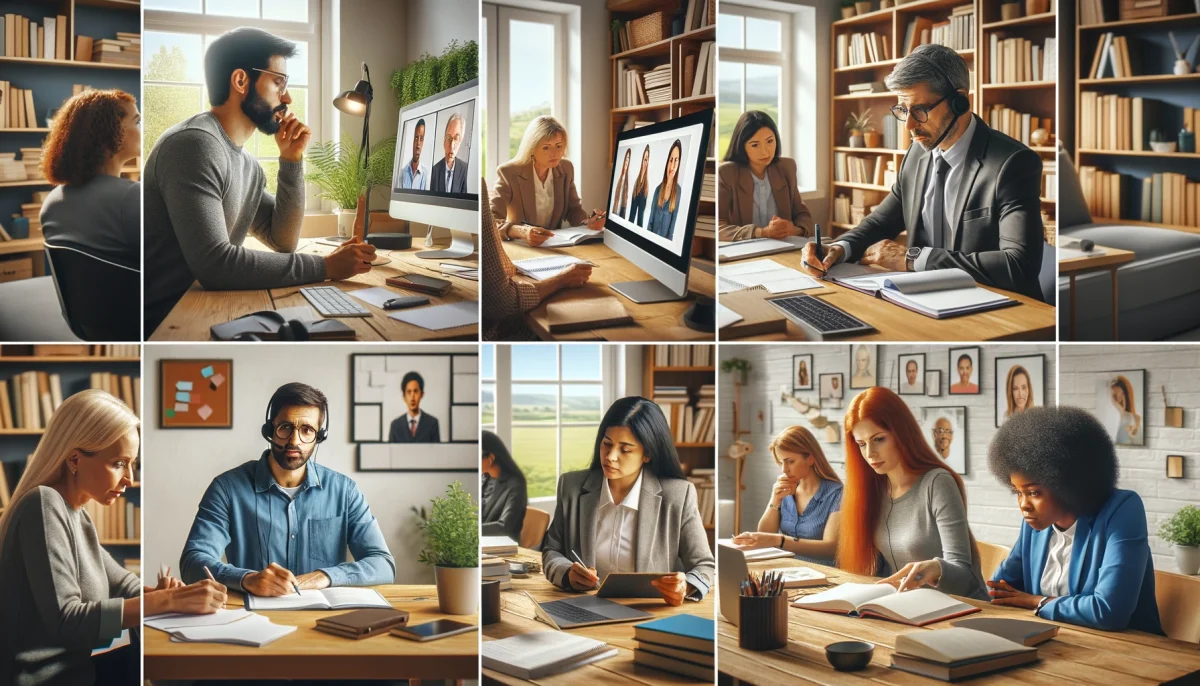Online group supervision for coaches offers a platform to reflect, learn, and grow in their practice through shared experiences and peer support. Here are some activities that can be used in these sessions:
- Case Studies: Coaches present real-life cases (with client confidentiality maintained) to discuss their approaches, challenges faced, and outcomes. Peers provide feedback and alternative strategies that could have been applied.
- Role Play: This activity involves coaches acting out different scenarios to practice and refine their coaching techniques. Peers and supervisors observe and offer constructive feedback on communication style, questioning techniques, and handling of difficult situations.
- Skill Building Exercises: Supervisors can introduce specific coaching skills, such as active listening or powerful questioning, and lead exercises where coaches practice these skills in breakout groups.
- Peer Coaching: Coaches pair up to practice coaching each other. This not only helps in refining their coaching skills but also allows them to experience the role of a coachee, providing insight into how their clients might feel.
- Reflective Journaling: Coaches are encouraged to keep a journal of their coaching experiences and reflections. Select entries can be discussed during the supervision to delve deeper into personal growth and understanding.
- Group Discussion on Articles or Books: Pre-assign reading materials relevant to coaching theories or techniques. Use the group sessions to discuss the key takeaways, how they apply to the coaches’ practices, and any points of contention or confusion.
- Feedback Sessions: Coaches take turns receiving structured feedback on their coaching style from their peers, guided by specific criteria provided by the supervisor to ensure constructive and useful comments.
- Ethical Dilemmas: Discuss hypothetical or anonymised real scenarios that pose ethical questions or dilemmas. This can help coaches understand the ethical framework and think critically about how to handle complex situations.
- Goal Setting Workshops: Focus sessions on setting professional development goals within the coaching practice. Peers help to refine these goals and suggest actionable steps to achieve them.
- Mindfulness and Self-Care Practices: Start or end sessions with mindfulness exercises aimed at reducing stress and improving concentration. Discuss self-care strategies that coaches can use to maintain their well-being, which is crucial in the helping professions.
- Review of Recorded Sessions: Coaches can share recordings of their coaching sessions (with client consent) for group analysis. This allows for detailed feedback on specific aspects of the coach’s technique, such as body language, tone, and the use of open-ended questions.
- Theory Application: Assign a specific coaching theory or model for the group to study in advance. During the session, each coach can present how they have applied or could apply this theory in their practice. This helps integrate theoretical knowledge with practical application and stimulates discussion on various approaches.
- Supervision Round Robin: In this activity, each coach briefly presents a current challenge they are facing in their coaching practice. The group then has a set amount of time to offer advice, resources, and strategies to address the challenge. This promotes collaborative problem-solving and peer learning.
- Tool and Resource Sharing: Coaches share tools, resources, or digital platforms they find effective in their coaching practice. This could include apps, questionnaires, feedback forms, or articles. Sharing these resources helps coaches discover new methods and tools that they might not have encountered otherwise.
- Guest Speaker Sessions: Invite an expert in a specific area of coaching or psychology to the supervision meeting to provide a lecture or workshop. This could cover topics such as advanced coaching techniques, new research in psychology relevant to coaching, or even business aspects of running a coaching practice. This enhances the learning experience by bringing external expertise into the group.
- Shared Success Stories: Coaches take turns sharing their recent successes, detailing the strategies they employed and the outcomes achieved. This activity boosts morale and provides peers with replicable models of effective coaching practices.
- Challenge the Coach: A coach presents a particularly tough coaching scenario they encountered, without revealing how they resolved it. The group then brainstorms potential solutions and approaches. Afterwards, the presenting coach shares their actual approach and results, allowing for a comparison and discussion of different strategies.
- Cultural Competence Workshop: Focus on enhancing cultural competence among coaches by discussing different cultural dynamics that may affect coaching relationships. This could involve role-playing to handle culturally sensitive situations or discussing case studies that highlight cultural challenges.
- Professional Development Planning: Facilitate a session where each coach develops or revises their professional development plan. Peers and the supervisor provide feedback and suggest resources that could help achieve these goals, such as courses, books, or certifications.
- Interactive Webinars: Use webinars where coaches can interact with the content in real-time. Choose topics relevant to their needs and challenges, such as dealing with burnout, leveraging technology in coaching, or advanced coaching methodologies. This format can also include polls, Q&A sessions, and breakout rooms for small group discussions.
These activities not only support the development of coaching skills but also foster a community of practice where coaches can learn from each other and enhance their professional competence.
[Written and illustrated with the help of ChatGPT 4.]

